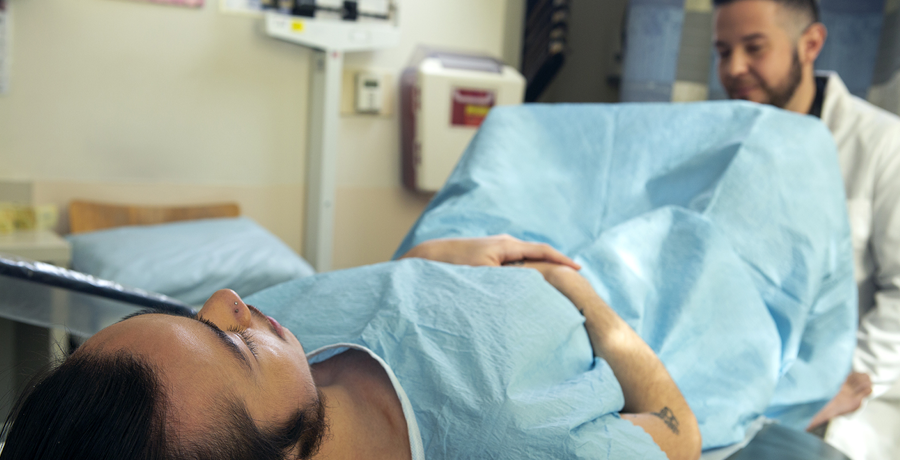Testosterone And Cramps Ftm
Q&A: Gynecologic and vaginal care for trans men
Dr. Juno Obedin-Maliver shares advice on dryness, pelvic pain, infections and other vaginal and frontal genital opening health issues.
July 23, 2019 5 Minute Read

For trans guys on gender-affirming testosterone, Juno Obedin-Maliver, MD, MPH, MAS has this advice: Be open, and talk to your provider about what you experience—for all aspects of your body, including your frontal genital opening, vagina or front hole.

"Your entire body changes on testosterone. I think oftentimes, people focus on their facial hair, or muscle structure or their voice deepening. But the vagina will change too, and being aware of these changes and communicating any questions, concerns or issues can help prevent discomfort and pain," she said.
Dr. Obedin-Maliver, an assistant professor of obstetrics and gynecology at Stanford who specializes in the health care of sexual and gender minority people, answered our questions about common vaginal and frontal genital opening issues that trans guys may experience—and gave advice for treatments and health services that may help.
BETA: When you see transmasculine clients, what do you typically start out by assessing in terms of vaginal or frontal hole opening health?
Dr. Juno Obedin-Maliver: The first thing I ask is, "How are you doing? How are you feeling?" Your vagina or frontal genital opening should feel comfortable. A small amount of white or clear discharge is normal or healthy. There shouldn't be any pain. If there's pain, or discomfort (either with or without sexual activity), or if something doesn't smell right, these are things that should get checked out.
A lot of people—cis folks and trans folks—are walking around with a lot of discomfort. We know that about 25% of trans people delay or avoid getting medical care because of bad experiences with a health care provider. I bet that number would be higher when it comes to genital issues.
Vaginal dryness can be an issue for trans guys taking testosterone. What is that caused by, and is there any treatment for it?
Testosterone decreases the resilience of the vaginal tissues and the amount of natural lubrication, which can make the tissue more prone to tearing or micro abrasions. This—what we call "vaginal atrophy"—can make it more uncomfortable for people just walking around, and certainly during sexual activity.
The vagina is an estrogen-responsive organ. When you remove estrogen, this [vaginal atrophy] is what happens to the tissues. The atrophy doesn't happen right away—it may be months or years after being on testosterone.
After I've made sure that it's not caused by an STI or something else, we can treat vaginal atrophy with local estrogen for maybe a few weeks (sometimes longer). You can apply the estrogen with a cream, a tablet that dissolves in the vagina, or with a ring that you place in the vagina that stays there. The estrogen levels you get from one of these methods are so low that there's no risk that they will counteract or reverse the effects of gender-affirming testosterone.
Pelvic pain is another issue that trans guys on testosterone report. Is this something you've seen in your clients, and if so, what treatments are available?
I have noticed that there is something around the administration of testosterone that causes cramping for a lot of guys. It's not well-studied, but it is something that gynecologists that take care of trans guys talk about. We don't know all of the impacts that testosterone has on the uterus and pelvic muscles.
If we think pelvic pain is caused by testosterone, we can do a few things. The first is to make the dosing more even—so there are less peaks and troughs in drug levels. We can give anti-inflammatory medications before and after testosterone levels peak and trough, and muscle relaxants can help too.
There are a lot of other causes of pelvic pain too. It can come from any of the organs in the belly: the ovaries, uterus and fallopian tubes (if a person still has those organs). There are a dozen different muscles in the pelvis, and pain can come from any inappropriate firing of those muscles. Pain can come from the bladder, or the bowels. So we'll assess if the pain is associated with any activity (like riding a bike, or peeing) or any specific movement that may be causing it.
Are urinary tract infections (UTIs) and BV a concern?
Urinary tract infections and BV are common for people with frontal genital openings whether on testosterone or not. Both of these can also be related to or made worse by vaginal atrophy related to testosterone. The urethra is also estrogen-responsive, so trans guys on testosterone likely have an increased risk for UTIs, especially if they're having penis-in-vagina or penis-in-frontal genital opening sex.
UTIs are easily treatable. If people are getting repeated UTIs, it may be worth it to do a course of vaginal estrogen. Sometimes, we will put someone on standing antibiotics (continuous, low-dose antibiotics) to prevent UTIs.
BV (bacterial vaginosis) treatment is very straightforward—it's either pills or a cream for a week. Again, if BV keeps coming back, I might recommend a short course of vaginal estrogen.
How feasible do you think it is for trans guys to be able to advocate for some of the treatments you mention—for example topical estrogen—if health care providers aren't familiar with these types of treatments or don't specialize in trans health care?
It does put a lot on the patient, and medical care shouldn't be that way. You don't expect patients to tell their providers about diabetes, for example. But, that's not where we are at, yet. I'd say that these treatments may be a paradigm shift for some providers. You may be a 22-year-old trans guy who needs vaginal estrogen. Vaginal estrogen is a really common treatment for post-menopausal cis women. So trans people may need to inform their providers.
If they say, "Look, testosterone causes vaginal atrophy. Vaginal atrophy can mean it's painful for me to have sex. Can I have vaginal estrogen?" A provider would see that as a logical, physiological conclusion.
What happens to monthly bleeding on testosterone? Can trans guys expect that it will stop with hormone use?
A lot of transmasculine guys don't want periods, and maybe 80% of the time testosterone will eventually cause bleeding to stop. But not always, and not immediately. It usually takes six to nine months of steady doses of testosterone.
If you're still bleeding every month after 9-12 months on testosterone, it doesn't mean anything is wrong. There are other ways we can stop monthly bleeding: the Depo-Provera shot and levonorgestrel-releasing IUD can help stop monthly bleeding by a few months. Oftentimes, health care providers will start their patients on one of these at the same time they start hormones. That can be a win-win, if the person also wants to be on birth control.
How long it takes to stop bleeding every month can depend on where a person is starting from. If they have very light bleeding, it's going to happen faster than if they had very heavy bleeding to start with.
If a person is on a steady dose of testosterone, and they're still bleeding every month at the one-year mark, it would be worth having a discussion with a gynecologist. There could be another cause of it, such as fibroids or polyps.
Are pap smears recommended for trans guys?
Yes. The short of it is, if you have an organ, screen it. If trans guys have a cervix, then pap smears are recommended. People should know that there isn't any clear evidence of increased risk of cancer of the cervix, ovaries or uterus if a person is on testosterone.
Join the PRIDE Study
Led by Dr. Obedin-Maliver , the PRIDE Study is a long-term national health study with people who identify as lesbian, gay, bisexual, transgender, queer or another sexual or gender minority. Participating provides vital insights on the health and well-being of all LGBTQ people.
Ready to join? Go to pridestudy.org .
Source: https://www.sfaf.org/collections/beta/qa-gynecologic-and-vaginal-care-for-trans-men/

0 komentar:
Posting Komentar